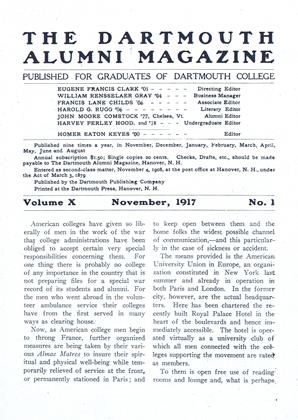Military training will play an important part this year in the undergraduate work of the College. All freshmen are required, unless excused by the Medical Director of the College, to devote six hours a week to military and gymnasium training; and an advanced course is given as a regular elective open to men in the three upper classes who have had some previous training.
For this work Captain Louis Keene of the Canadian Army has been retained as one of the staff. Captain Keene was among the first of the Canadian volunteers to reach European battle fields, and was seriously wounded by a shell explosion late in 1915. Invalided home, he has been engaged in instructing in the principles of trench warfare and machine gun use, in which he is a recognized expert.
Associated with Captain Keene on the Dartmouth military staff is Lieutenant John S. Pickett, for seven and one-half year connected with the Massachusetts First Corps Cadets, later the United States 101st Engineers. Lieutenant Pickett has served in all grades to lieutenant. He graduated, second in his class, in 1915 from the Massachusetts National Guard Training School, where he was Cadet Captain and Adjutant. He has had extensive experience in charge of recruit drill. He was instructor, during the year 1915-16, of the Business and Professional Men's Training Battalion, conducted by the First Corps Cadets, and has been, during the past summer, tactical officer at the Williams College Military camp, Williams-town, Massachusetts.
The detailed program of the advanced course, in which sixty-one seniors, juniors, and sophomores are now enrolled, is as follows:
3. Advanced Military Training. Captain Keene, Lieutenant Pickett and others.
First and Second Semesters, 3 hrs.
A course covering drill regulations, rifle practice, machine gunnery, sniping, bombing, minor tactics of trench warfare, guard duty; field service regulations, map reading, co-operation of artillery with infantry, preparation of division for offense; personal hygiene, first aid; military history of the United States, international law as related to army practice; foreign military insignia and organizations.
Lectures, field work, recitations, quizzes, and final examinations.
 View Full Issue
View Full Issue
More From This Issue
-
 Article
ArticleA LETTER FROM THE FRONT
November 1917 -
 Article
ArticleTHE NEED FOR UNUSUALNESS IN THE WORK OF THE COLLEGE
November 1917 By Hopkins -
 Article
ArticleAmerican colleges have given so liberally of men
November 1917 -
 Article
ArticleDARTMOUTH WAR RECORD
November 1917 -
 Article
ArticlePLATTSBURG-A TRIUMPH OF EFFICIENCY AND DEMOCRACY
November 1917 -
 Books
BooksArgumentation and Debate
November 1917 By WARREN CHOATE SHAW







